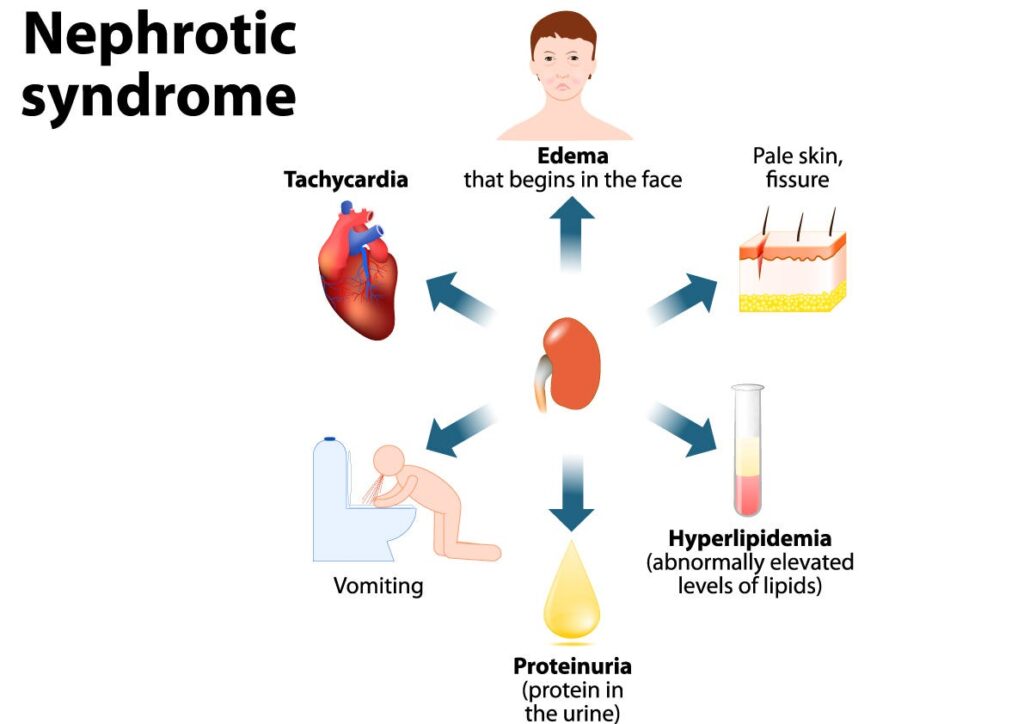Nephrotic Syndrome in Children- Causes and Symptoms

Nephrotic Syndrome In Children- newsmint.in
Nephrotic Syndrome is a condition that can affect children, and it involves problems with their kidneys. These tiny organs in the body help filter out waste and excess fluids, but when something goes wrong, it can lead to Nephrotic Syndrome. One common sign is swollen legs and eyes, which happens because the kidneys aren’t doing their job properly and let too much protein slip into the urine. This can make kids look puffy and cause their bodies to retain water. Be here till the end to learn more about Nephrotic Syndrome.
Another important thing to know is that Nephrotic Syndrome can be caused by various things, like infections or certain diseases. Sometimes, doctors use special medicines to treat it, and they might even recommend a special diet to help reduce swelling. It’s important for kids with Nephrotic Syndrome to see their doctors regularly to make sure everything is under control. While it can be a challenging condition, with the right care, many children can lead normal and healthy lives.
What Is Nephrotic Syndrome In Children?
Well, Nephrotic Syndrome is a kidney disorder that can affect children, typically between the ages of 2 and 6 years. It is characterized by a group of symptoms caused by kidney damage. Including the presence of excess protein in the urine, swelling (edema) around the eyes, ankles, and abdomen, as well as elevated cholesterol levels. Nephrotic Syndrome is often the result of a malfunction in the tiny filtering units of the kidneys called glomeruli. This condition can be caused by various underlying factors. The most common form in children is called Minimal Change Disease. While it can be concerning, it is usually treatable with medications, and many children respond well to therapy, ultimately leading to a positive prognosis. Regular medical monitoring and management are crucial to ensure the child’s long-term kidney health.
Nephrotic Syndrome Symptoms

Nephrotic Syndrome, though it may sound complicated, is a kidney disorder that affects both children and adults. It’s important to understand this condition, its symptoms, causes, and available treatments, so you or your loved ones can manage it effectively. In this article, we will break down Nephrotic Syndrome in easy-to-understand language.
- Swelling: One of the most common signs of Nephrotic Syndrome is swelling, particularly in the legs, ankles, and feet. This swelling, called edema, occurs because the kidneys can’t properly filter out excess fluid, leading to a build-up in the body.
- Protein in Urine: Healthy kidneys keep essential proteins in your blood. However, in Nephrotic Syndrome, the kidneys let these proteins, especially albumin, escape into the urine. This leads to a condition called proteinuria.
- High Cholesterol: Nephrotic Syndrome can cause your body to produce too much cholesterol, increasing your risk of heart disease.
- Fatigue: As your body loses important proteins, you might feel tired or weak.
- Foamy Urine: Another noticeable sign is foamy or frothy urine, which is due to the excess protein in your urine.
What Causes Nephrotic Syndrome?
- Minimal Change Disease: This is the most common cause in children. The exact reason is often unknown, but it seems to be related to an abnormal immune system response.
- Focal Segmental Glomerulosclerosis (FSGS): FSGS is more common in adults. It’s often associated with conditions like diabetes, obesity, and high blood pressure.
- Membranous Nephropathy: This is often linked to autoimmune diseases, infections like hepatitis B or C, or certain medications.
- Systemic Lupus Erythematosus (SLE): SLE, or lupus, is an autoimmune disease that can affect the kidneys, leading to Nephrotic Syndrome.
- Amyloidosis: Rarely, proteins called amyloids build up in the kidneys, causing Nephrotic Syndrome.
Nephrotic Syndrome Treatments
- Medications: Your doctor may prescribe medications like corticosteroids or immunosuppressants to reduce inflammation and control your immune system’s response.
- Diuretics: These drugs help your body get rid of excess fluid, reducing swelling.
- Dietary Changes: Reducing salt and fat intake can help manage high blood pressure and cholesterol associated with Nephrotic Syndrome.
- Medications for Underlying Causes: If your Nephrotic Syndrome is secondary to another condition, such as diabetes or lupus, treating the underlying cause is crucial.
- ACE Inhibitors or ARBs: These medications can help manage blood pressure and reduce protein loss in urine.
- Dialysis: In severe cases, when the kidneys are no longer functioning properly, dialysis may be necessary to filter waste products and excess fluid from the body.
- Kidney Transplant: If kidney function cannot be restored through other treatments, a kidney transplant may be considered.
Well, It’s important to remember that Nephrotic Syndrome is a manageable condition. With early detection and proper medical care, many people with Nephrotic Syndrome can lead healthy lives. Regular check-ups, following your doctor’s advice, and a healthy lifestyle are key to managing this condition effectively.
Additionally, we can say Nephrotic Syndrome is a kidney disorder characterized by swelling, proteinuria, high cholesterol, and other symptoms. Its causes can vary, from minimal change disease to underlying conditions like diabetes and lupus. While there is no cure, the condition can be effectively managed through medications, lifestyle changes, and, in extreme cases, kidney transplants or dialysis. If you or a loved one experiences any of the symptoms of Nephrotic Syndrome, it’s crucial to seek medical advice for early diagnosis and treatment.